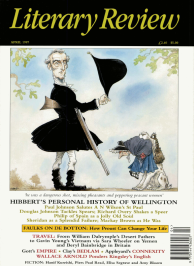Maureen Freely
How to Stay Together
The Taste of a Man
By Slavenka Drakulic
Abacus 2 12pp £9.99
Tereza is a nice Polish Catholic poet who has come to New York University to study literature. Jose is a ‘roughly handsome’ Brazilian anthropologist, also Catholic, who has come to the same university to research a book on the theological debate provoked by the 1972 Andes air crash survivors who ate their dead fellow passengers to stay alive. When Tereza happens to sit across from him at the New York Public Library, nothing could interest her less than a study of cannibalism. The only reason she notices the book he is reading is that its title, Divine Hunger, sounds poetic. But after she and Jose have retreated from the world into her apartment and an affair so consuming that food and drink provide the only relief from sex and sleep, Tereza spends more and more time thinking about the Andes survivors. What intrigues her most is the argument put forward by Pedro Agorte, one of their leaders: eating human flesh in order to survive was, he said, like taking Holy Communion.
Jose is a married man with a son and another baby on the way. When it becomes clear to Tereza that he is going to have to put his feelings to one side and return to his life in Brazil, the thought of living without him seems worse than death. Her only hope, she decides, is to take drastic measures to bring about the spiritual and physical union. Does Jose know that his ‘apparently frail’ lover is allowing her thoughts to travel in this dangerous direction? It is not clear, because by the time we meet Tereza, she is already ‘at one’ with him. She has four days left in New York before she returns to Poland to spend Christmas with her father, and she confesses all to the reader while giving her sub-let the best cleaning it has ever seen. Lady Macbeth couldn’t have tried harder.
Nowhere does Tereza admit to guilt or remorse. Even at the end, she is still able to convince herself that she has done only the right thing. She is sure that Jose knew what she had in mind to do and gave his tact approval, but the facts she herself presents do not bear her story out. You know she’s several thousand sandwiches short of picnic long before her dreaded last supper: the closer you get to the end, the less you want to arrive. At the same time the prospect of leaving the book half-way through and spending the rest of your life wondering about how and why seems even worse, and so you continue to drag yourself morbidly from sentence to sentence. The whole thing would be easier to bear – and a delight to ridicule – if a few of these sentences were over the top. But the more Tereza flirts with the ultimate taboo, the cleaner and more restrained the prose, and the more Catholic its sensibilities. In the end, this is not a book about sex and animal appetites, but about conscience and sacrilege, even the sanctity of life. Just reading it made me feel guilty –perhaps that’s just as well, because the moral of the story is that it’s guilt that makes you human. But it does seem as shame that because of this book, I’ll never be able to kneel before a priest and receive the body of Christ without flinching.

Sign Up to our newsletter
Receive free articles, highlights from the archive, news, details of prizes, and much more.@Lit_Review
Follow Literary Review on Twitter
Twitter Feed
It wasn’t until 1825 that Pepys’s diary became available for the first time. How it was eventually decrypted and published is a story of subterfuge and duplicity.
Kate Loveman tells the tale.
Kate Loveman - Publishing Pepys
Kate Loveman: Publishing Pepys
literaryreview.co.uk
Arthur Christopher Benson was a pillar of the Edwardian establishment. He was supremely well connected. As his newly published diaries reveal, he was also riotously indiscreet.
Piers Brendon compares Benson’s journals to others from the 20th century.
Piers Brendon - Land of Dopes & Tories
Piers Brendon: Land of Dopes & Tories - The Benson Diaries: Selections from the Diary of Arthur Christopher Benson by Eamon Duffy & Ronald Hyam (edd)
literaryreview.co.uk
Of the siblings Gwen and Augustus John, it is Augustus who has commanded most attention from collectors and connoisseurs.
Was he really the finer artist, asks Tanya Harrod, or is it time Gwen emerged from her brother’s shadow?
Tanya Harrod - Cut from the Same Canvas
Tanya Harrod: Cut from the Same Canvas - Artists, Siblings, Visionaries: The Lives and Loves of Gwen and Augustus John by Judith Mackrell
literaryreview.co.uk